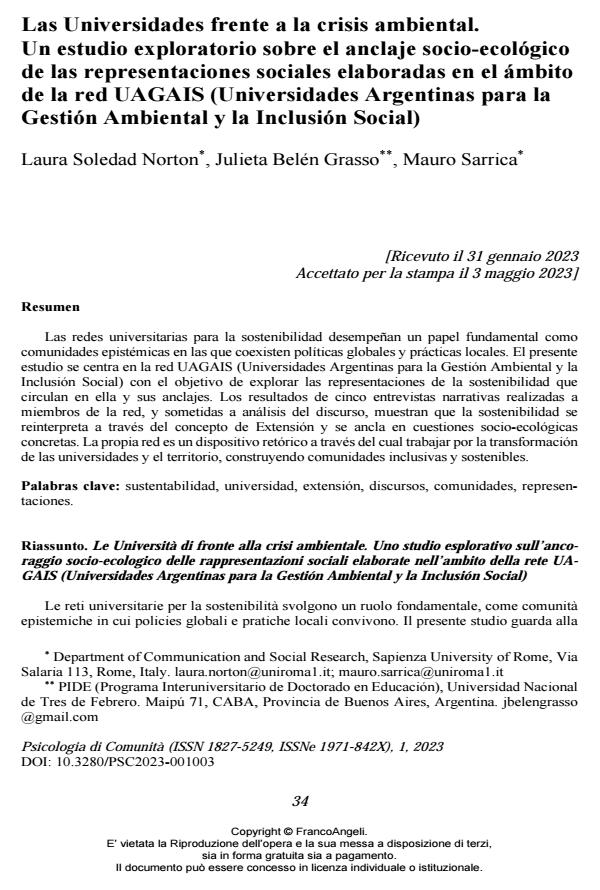Las Universidades frente a la crisis ambiental. Un estudio exploratorio sobre el anclaje socio-ecológico de las representaciones sociales elaboradas en el ámbito de la red UAGAIS (Universidades Argentinas para la Gestión Ambiental y la Inclusión Social)
Titolo Rivista PSICOLOGIA DI COMUNITA’
Autori/Curatori Laura Soledad Norton, Julieta Belén Grasso, Mauro Sarrica
Anno di pubblicazione 2023 Fascicolo 2023/1
Lingua Spagnolo Numero pagine 20 P. 34-53 Dimensione file 242 KB
DOI 10.3280/PSC2023-001003
Il DOI è il codice a barre della proprietà intellettuale: per saperne di più
clicca qui
Qui sotto puoi vedere in anteprima la prima pagina di questo articolo.
Se questo articolo ti interessa, lo puoi acquistare (e scaricare in formato pdf) seguendo le facili indicazioni per acquistare il download credit. Acquista Download Credits per scaricare questo Articolo in formato PDF

FrancoAngeli è membro della Publishers International Linking Association, Inc (PILA), associazione indipendente e non profit per facilitare (attraverso i servizi tecnologici implementati da CrossRef.org) l’accesso degli studiosi ai contenuti digitali nelle pubblicazioni professionali e scientifiche.
Las redes universitarias para la sostenibilidad desempeñan un papel fundamental como comunidades epistémicas en las que coexisten políticas globales y prácticas locales. El pre¬sente estudio se centra en la red UAGAIS (Universidades Argentinas para la Gestión Ambiental y la Inclusión Social) con el objetivo de explorar las representaciones de la sostnibilidad que circulan en ella y sus anclajes. Los resultados de cinco entrevistas narrativas realizadas a miembros de la red, y sometidas a análisis del discurso, muestran que la sosteibilidad se reinterpreta a través del concepto de Extensión y se ancla en cuestiones socio-ecológicas concretas. La propia red es un dispositivo retórico a través del cual trabajar por la transformación de las universidades y el territorio, construyendo comunidades inclusivas y sostenibles. Palabras clave: sustentabilidad, universidad, extensión, discursos, comunidades, represen-taciones.
Le reti universitarie per la sostenibilità svolgono un ruolo fondamentale, come comunità epistemiche in cui policies globali e pratiche locali convivono. Il presente studio guarda alla rete UAGAIS (Universidades Argentinas para la Gestión Ambiental y la Inclusión Social) con l’obiettivo di esplorare le rappresentazioni della sostenibilità che in essa circolano ed i loro an-coraggi. I risultati di cinque interviste narrative svolte con membri della rete, e sottoposte ad analisi del discorso, mostrano che la sostenibilità è reinterpretata attraverso il concetto di Ex-tensión ed è ancorata a specifiche questioni socio-ecologiche. La rete stessa è un dispositivo retorico attraverso cui operare per la trasformazione delle Università e del territorio, costruendo comunità inclusive e sostenibili.
Parole chiave:reti universitarie, comunità sostenibili, rappresentazioni sociali, analisi del discorso, Extensión.
- Liderazgo en la gestión de la Investigación en universidad pública chilena Luis H. Santander, Francisco Ganga-Contreras, Ximena Vega Donoso, Wendolin Suárez, in Revista Venezolana de Gerencia /2025 pp.1529
DOI: 10.52080/rvgluz.30.especial14.42
Laura Soledad Norton, Julieta Belén Grasso, Mauro Sarrica, Las Universidades frente a la crisis ambiental. Un estudio exploratorio sobre el anclaje socio-ecológico de las representaciones sociales elaboradas en el ámbito de la red UAGAIS (Universidades Argentinas para la Gestión Ambiental y la Inclusión Social) in "PSICOLOGIA DI COMUNITA’" 1/2023, pp 34-53, DOI: 10.3280/PSC2023-001003